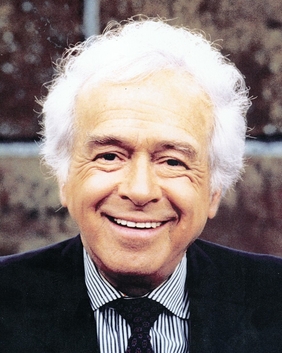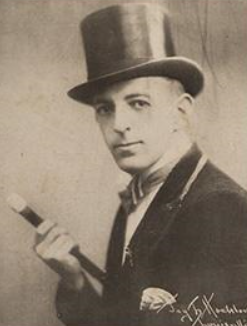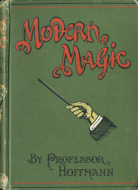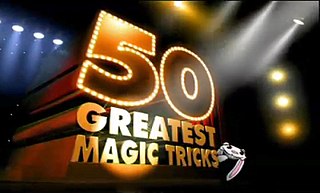Related Research Articles

David Seth Kotkin, known professionally as David Copperfield, is an American magician, described by Forbes as the most commercially successful magician in history.
Sleight of hand refers to fine motor skills when used by performing artists in different art forms to entertain or manipulate. It is closely associated with close-up magic, card magic, card flourishing and stealing. Because of its heavy use and practice by magicians, sleight of hand is often confused as a branch of magic; however, it is a separate genre of entertainment and many artists practice sleight of hand as an independent skill. Sleight of hand pioneers with worldwide acclaim include Dan and Dave, Ricky Jay, Derek DelGaudio, David Copperfield, Yann Frisch, Norbert Ferré, Dai Vernon, Jerry Sadowitz, Cardini, Tony Slydini, Helder Guimarães and Tom Mullica.

Harry Lorayne was an American mnemonist, magician, and author who was called "The Yoda of Memory Training" and "The World's Foremost Memory-Training Specialist" by Time magazine. He was well known for his incredible memory demonstrations and appeared on numerous television shows–including 24 appearances on The Tonight Show Starring Johnny Carson. His book The Memory Book was a New York Times bestseller. His card magic, especially his innovations in card sleights, is widely emulated by amateur and professional magicians.

Richard Valentine Pitchford was a master magician under the name Cardini, whose career spanned almost half a century. Born in Britain, he worked chiefly in the United States of America.

F for Fake is a 1973 docudrama film co-written, directed by, and starring Orson Welles who worked on the film alongside François Reichenbach, Oja Kodar, and Gary Graver. Initially released in 1974, it focuses on Elmyr de Hory's recounting of his career as a professional art forger; de Hory's story serves as the backdrop for a meandering investigation of the natures of authorship and authenticity, as well as the basis of the value of art. Far from serving as a traditional documentary on de Hory, the film also incorporates Welles's companion Oja Kodar, hoax biographer Clifford Irving and Orson Welles as himself. F for Fake is sometimes considered an example of a film essay.
David Copperfield has performed a levitation illusion in several magic shows since 1992 in which he appears to fly on stage for several minutes, while surrounded by audience members. The flight is notable for its graceful motion and unencumbered appearance. The illusion was included in Copperfield's CBS TV special The Magic of David Copperfield XIV: Flying—Live The Dream (1992), and has been repeated several times during Copperfield's live tours around the world. The method was created by John Gaughan. An essential contribution to make fluid movements was given by his assistant, dancer and choreographer Joanie Spina.
Rudy Coby, also known as "Labman", is an American comedic magician. He is a member of the Magic Castle in Los Angeles. In the early 1990s, Coby appeared in several small theatrical live shows, and on broadcast television. He is known for delivering electric and original comedic performances, of which stage magic plays a large part. He also works closely with rock musician and film director Marilyn Manson.
Richard J. Wiseman is a professor of the public understanding of psychology at the University of Hertfordshire in the United Kingdom. He has written several psychology books. He has given keynote addresses to The Royal Society, The Swiss Economic Forum, Google and Amazon. He is a fellow for the Committee for Skeptical Inquiry and a patron of Humanists UK. Wiseman is also the creator of the YouTube channels Quirkology and In59Seconds.

Penn & Teller's Cruel Tricks for Dear Friends is a 1987 direct-to-video program hosted by magicians Penn & Teller. Produced by The Mofo Video Corp. and released by Lorimar Home Video, the tape features seven different swindles or tricks that the home viewer can use to fool their friends. The tape was a companion piece to their best-selling book of the same name, released two years later. All of the tricks involve using a portion of the videotape.
Howard Schwarzman was an American magician, card manipulator, sleight of hand expert, and trick inventor. Considered a "living legend" in the Eastern United States magician community, he was best known as a columnist within the magician trade press, and an importer of very rare tricks from outside the United States.

David Berglas was a German-born British magician and mentalist. His secret technique of locating a particular card within a pack has been described as the Holy Grail of card magic. He was one of the first magicians to appear on UK television.

Around the World is a musical based on the 1873 Jules Verne novel Around the World in Eighty Days, with a book by Orson Welles and music and lyrics by Cole Porter. It involves an around-the-world adventure by Phileas Fogg. The expensive musical extravaganza opened on Broadway in May 1946 but closed after 75 performances.
Platform magic is magic that is done for larger audiences than close-up magic and for smaller audiences than stage magic. It is more intimate than stage magic because it does not require expensive, large-scale stage equipment and can thus be performed closer to the audience and without a stage. Many of the tricks performed by platform magicians are sufficiently angle-sensitive as to make them impossible to perform as micromagic. Most working magicians are parlor/platform magicians.

Magic, which encompasses the subgenres of illusion, stage magic, and close-up magic, among others, is a performing art in which audiences are entertained by tricks, effects, or illusions of seemingly impossible feats, using natural means. It is to be distinguished from paranormal magic which are effects claimed to be created through supernatural means. It is one of the oldest performing arts in the world.
The Mercury Wonder Show for Service Men was a 1943 magic-and-variety stage show by the Mercury Theatre, produced by Orson Welles and Joseph Cotten as a morale-boosting entertainment for US soldiers in World War II. Directed by Welles, the show starred Welles, Cotten, Agnes Moorehead and Rita Hayworth, whose part was later filled by Marlene Dietrich. Jean Gabin also worked on the show backstage, as a propman. The show ran to 150 minutes.

Modern Magic by Professor Hoffmann is a treatise in book form, first published in 1876, detailing the apparatus, methods and tricks used by the magicians and conjurors of that era. Hoffmann was considered to be one of the greatest authorities on the theory and practice of magic, despite his own limited professional experience as a magician.

A levitation illusion is one in which a magician appears to defy gravity by making an object or person float in the air. The subject may appear to levitate unassisted, or it may be performed with the aid of another object in which case it is termed a "suspension".

50 Greatest Magic Tricks is a one-off list show that was produced by Objective Productions for Channel 4. The programme counted down the fifty greatest magic tricks, as voted for by members of The Magic Circle. The illusion at number one was Death Saw by David Copperfield. The show was presented by British comedy duo Adam and Joe, who also wrote and narrated the programme. The show was first broadcast on Channel 4 on 6 May 2002.
Jack Kodell was an American stage magician.
References
This article includes a list of references, related reading, or external links, but its sources remain unclear because it lacks inline citations .(October 2014) |